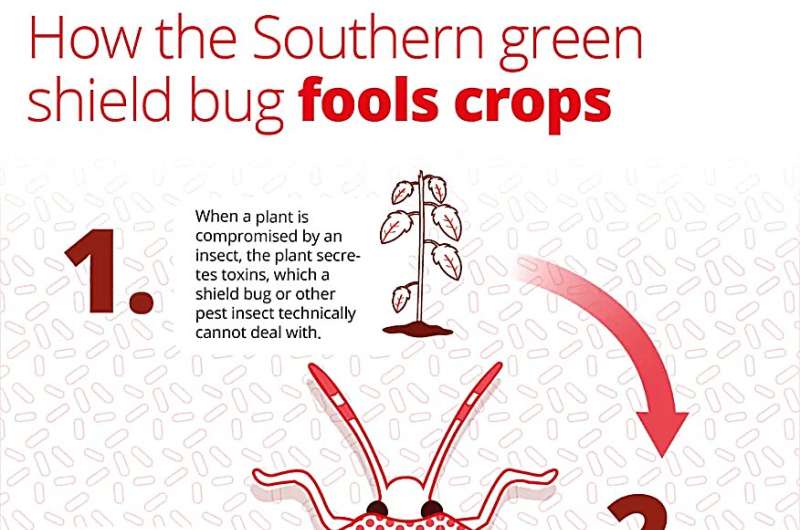This article has been reviewed according to Science X's editorial process and policies. Editors have highlighted the following attributes while ensuring the content's credibility:
fact-checked
trusted source
proofread
Bacteria of the shield bug protect the insect by degrading plant toxins

The Southern green shield bug is a major problem for food production. The insect loves tomatoes, cucumbers and bell peppers and is responsible for up to 40% of crop losses.
Ph.D. research by Magda Rogowska-van der Molen, in collaboration with plant biologist Silvia Coolen, shows that the bacteria of the shield bug protect the insect by degrading plant toxins. These bacteria also make sure that the plant doesn't produce toxins against the bug. Magda will receive her doctorate on this topic on July 3, 2024, at Radboud University.
Due to global warming, the Southern green shield bug is migrating North. A lot of food producing plants have no sufficient defense against these bugs. "Plants evolve incredibly slowly," explains microbiologist Magda Rogowska-van der Molen. "Unlike bacteria, which evolve at lightning speed and develop ways to work around the plant's defenses. The plant has no answer to that."
This is how it works: when a plant is compromised by an insect, the plant secretes toxins, which a shield bug or other pest insect technically cannot deal with. The microbiologist's research shows that the Southern green shield bug has specific bacteria in its gut that can render the plant's toxins harmless.
"What was also remarkable was that, via the bug's saliva, other bacteria are transmitted to the plant to decrease the defense mechanisms against the bug." The plant produces less toxins and the toxins that do reach the bug, are degraded by the bacteria of the bug." The shield bug could then continue compromising the plant without much problem.
Rogowska-van der Molen states, "We now finally understand how this works. The shield bug's success is thanks to its salivary bacteria and gut bacteria: the plant is defenseless against the bug and even if the plant is able to make toxins, the bacteria of the bug degrade those toxins.
"Now that we know that, we can start looking at how—without pesticides—we can target those specific bacteria, so that the shield bug no longer stands a chance. With that, a targeted pest control can be developed."
Provided by Radboud University


















